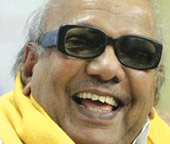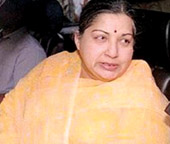|
observer |
|
|
|
|
|
OTHER LINKS |

|

|

|
The Tamil Nadu Election: New political realities replace old
separatist rhetoric
|
|
|
|
The outcomes of the recent State Assembly elections in Tamil Nadu, West Bengal, Kerala, Assam and Pondicherry are good news for the Congress-led UPA (United Progressive Alliance) government in New Delhi. The winning coalitions in the state elections are all part of the ruling alliance in Delhi, although in West Bengal and Kerala the main contest was between parties who also constitute the Delhi alliance.
In West Bengal, the Communist Party of India (Marxist) recorded its seventh election victory while across the country in Kerala, the CPI(M) defeated the incumbent Congress State government winning two-thirds of the Assembly seats. Congress-led coalitions won the elections in northeast Assam and southeast Pondicherry, while the Congress, the CPI(M) and the CPI are all part of the Democratic Progressive Alliance (DPA) led by the DMK that won the election in Tamil Nadu.
CPI(M)'s victories in West Bengal and Kerala will help strengthen "the role of the left in national politics", according to CPI(M)'s Secretary Prakash Karat. The CPI(M) gives critical support to the Manmohan Singh government in Delhi, while taking it to task over government policies in regard to increasing foreign investment and privatization and over Delhi's growing closeness to the Bush administration in the US.
Ironically, the national leadership of the CPI(M) has little say over the Chinese-styled liberal economic reforms, focused on foreign investment and privatization, pursued by the Party's popular Chief Minister Buddhadeb Battacharya in West Bengal.
Only in Tamil Nadu the election led to the ouster of a state government that was opposed to the central government in Delhi. The All India Anna Dravida Munnetra Kazhagam (AIADMK) led by Jayaraman Jayalalitha, the matinee actress turned political matron, has been in power since 2001 and is more of an ally of the BJP than the Congress and its allies. In the 2004 national election she campaigned hard for the reelection of the BJP government in Delhi, but the latter lost every central seat in Tamil Nadu to the Congress alliance.
Among the reasons for Jayalalitha's defeat are her opposition to the government in Delhi and the implementation of central government programs in Tamil Nadu, her earlier association with the Hindu fundamentalism of the BJP, the alienation of educational institutions, and the resentment towards her autocratic and personalized style of politics, not to mention her passion for shoes like Imelda Marcos.
Her government's inept handling of the scandalous crimes involving Jayendra Saraswathi, the Shankaracharya of the great 2500 year old Kanchi Temple, did not go down well with Tamilian elites. Many thought that her government had grown out of touch with the people and becoming unapproachable to its constituents.
Rural Poverty in India's Detroit
More substantively, the election brought to the fore the issues of rural poverty and the state's agrarian crisis. Superficial observers had fun about the election freebies - quality rice at reduced price, two eggs a week in school mid-day meals, bicycles for students, television sets for the poor etc. etc. - offered by the competing parties. But as Karunanidhi himself noted the offer of rice was not a political one-upmanship but an admission of the plight of the rural poor.
The last time rice was an election issue was also the first time the DMK won the State election, in 1967, forming the first non-Congress government after independence, with its founder leader C. N. Annadurai as Chief Minister. Forty years later despite Tamil Nadu's achievements and despite being touted by foreign investors as India's Detroit (the motorcar city in the US) and one of India's economically successful states, poverty and landlessness continue to stalk rural Tamil Nadu.
Apart from rice the DPA's manifesto includes a more substantial response to rural poverty - apparently at the insistence of the two Communist Parties: 2 acres of land to an estimated 4 million landless families and the waiver of loan payments after a farmer's death. As his first act after swearing in, the new Chief Minister, M. Karunanidhi, signed the administrative authority to implement these measures.
The World Bank and the IMF may see these measures as wasteful populism but they are in fact a reflection of the market's failure to serve marginalized populations. They are also a sad commentary on India's much vaunted Green Revolution and a reminder of the subversion and failure of land ceiling laws introduced since the 1960s. Apart from legal loopholes, successive governments have failed to redistribute surplus (ceiling) lands to the landless.
Adding injury to insult was the outgoing Jayalalitha government's controversial Wasteland Development Programme that allowed state lands to be given to Indian and foreign businesses. By the government's own figures about 4 million acres were divested under the programme benefiting just 110,000 farmers. This translates to 50% of land that the new government will have to find for nearly 40 times larger number of beneficiaries.
But giving land to the landless is hardly sufficient to address the agrarian crisis. Additional measures like irrigation, credits and marketing support, skills education of farmers, linkages with small industries and trade, and avenues for exports have to be promoted or undertaken by the state. The DPA's manifesto identifies these measures and the Left parties have indicated that they will push the new government to implement them in Tamil Nadu just as they have been implemented in West Bengal.
Social Fragments and Voter Patterns
The election results are by no means a verdict on the agrarian question only, but indicate multiple factors at work. This is the first election in Tamil Nadu in which the leading party did not win a majority of the seats in the legislature. The DMK-led alliance won 164 of the 234 seats but DMK alone won only 96 seats and will have to depend on its DPA partners to sustain the new government. The Congress Party won an impressive 35 out of the 40 seats it contested, while the CPI(M) and CPI won 9 and 6 seats respectively. These parties have decided to support the new governments from the outside without representation in the cabinet which is drawn from the DMK legislators only
By winning 61 seats against the DMK's 96, the AIADMK has shown that although defeated it has retained a strong electoral base in the State. In fact, it has made significant inroads in traditional DMK territory. In Chennai, the capital district, the AIADMK ended the DMK's total monopoly by winning seven of the 14 district seats, and it did even better in Coimbatore, Tamil Nadu's industrial capital and the home of the Gounder caste, winning 10 of the 14 seats and reducing the DMK's tally from 8 to 4.
Another feature of the voting pattern is the shift in party loyalties across caste boundaries. The 1977 split of the DMK into the Karunanidhi faction and the splinter ADMK faction led by Jayalalitha's mentor and acting partner M. G. Ramachandran came to be sustained mostly by their separate bases among the so called non-Brahmin backward castes. DMK has had its vote bank among the Vanniyars in the north-central and upper north districts of the State, while the ADMK has been relying on the Thevars who are distributed among the southern, western and the Cauvery Delta districts.
Interestingly in this election, the two castes have spilt along district lines and supported both parties. Additionally, the Vanniyars have their own party now (Pattali Makkal Katchi - PKP); the PKP won 17 seats and is supporting the new government. On the other hand, the DMK and its Congress ally have maintained their traditional support among the minority Muslim, Christian and the Dalit (Harijan) groups.
Only 22 of the new legislators are women, accounting for less than 10% and far short of the targeted 33%. Women's groups have called on the new government to implement the widow's pension scheme as promised and make the State Commission on Women a statutory body. Jayalalitha had put the Commission into disuse but tried to address the gender question in her own matriarchal way by promising in her manifesto to give four grams of gold to marrying women.
From separatist demagogue to national powerbroker
Tamil Nadu, previously Madras, was one of the first sates in the Indian Union to raise the cry of separation. The DMK which raised the cry and its offshoot AIADMK have alternated as the governing party for nearly 40 years, but Tamil nationalism or even regionalism was hardly an issue in the recent election. The Sri Lankan Tamil question was also not an issue in the Tamil Nadu election despite claims to the contrary south of the Palk Straits.
The political debate in Tamil Nadu is no longer about the Aryan North versus the Dravidian South but about which political alliance in the state is more capable of working with Delhi for the benefit of Tamil Nadu.
No one signifies the shift from regional separatism to functional federalism better than the DMK leader M. Karunanidhi, once the past master of alliterative separatist rhetoric but now a shrewd bargainer and a formidable powerbroker on the national political stage. At 83, despite not unfounded allegations of family bandyism, Karunanidhi has won again and is now Chief Minister for the fifth time since 1969.









